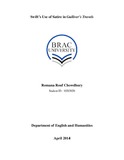| dc.contributor.advisor | Habib, Ms. Mushira | |
| dc.contributor.author | Chowdhury, Romana Rouf | |
| dc.date.accessioned | 2014-06-23T06:03:18Z | |
| dc.date.available | 2014-06-23T06:03:18Z | |
| dc.date.copyright | 2014 | |
| dc.date.issued | 2014-04 | |
| dc.identifier.other | ID 10203020 | |
| dc.identifier.uri | http://hdl.handle.net/10361/3320 | |
| dc.description | This thesis report submitted in partial fulfillment of the requirements for the degree of Bachelors of Arts in English at the Department of English and Humanities of BRAC University, 2014. | en_US |
| dc.description | Cataloged from PDF version of thesis report. | |
| dc.description | Includes bibliographical references (page 39-40). | |
| dc.description.abstract | Most works of literature contain the writers' ideas; often including their social criticism. One of the most prominent forms used to bring reform or change in the society or in individuals is that of satire. Satire can be considered as an essential device to bring out the author’s thought. This thesis concerns with the study of satire in Jonathan Swift's novel Gulliver's Travels. Through Gulliver's Travels, Swift attempted to satirize the proud eighteenth century population, who were too proud of the rapid scientific progress. Through my thesis, I am trying to show how Swift uses Gulliver to satirize the society in the eighteenth century England and beyond. In showing Swift's satire of the social condition, the discussion of Lemuel Gulliver's voyages to four different lands becomes symbolic and significant. By doing this study, I want to show the way Swift uses Gulliver in satirizing the society and the objects of his satire. Gulliver’s first voyage is to Lilliput, the land of little people, in which Swift satirizes the littleness of human beings; the second to Brobdingnag, the land of giants, is the satire on the meanness of humanity; the third, to the flying island of Laputa, is a satire on scientists and philosophers; and the final journey to the strangest land of all, that of the Houyhnhnms, is the satire on the denunciation of human species. Thus these four voyages of Gulliver represent Swift’s criticisms of and concerns about his own time and the future of humanity. | en_US |
| dc.description.statementofresponsibility | Romana Rouf Chowdhury | |
| dc.format.extent | 45 pages | |
| dc.language.iso | en | en_US |
| dc.publisher | BRAC University | en_US |
| dc.rights | BRAC University thesis reports are protected by copyright. They may be viewed from this source for any purpose, but reproduction or distribution in any format is prohibited without written permission. | |
| dc.subject | English and humanities | en_US |
| dc.title | Swift’s use of satire in Gulliver’s Travels | en_US |
| dc.contributor.department | Department of English and Humanities, BRAC University | |
| dc.description.degree | B.A. in English | |

